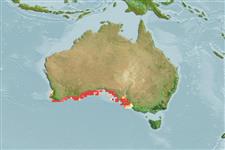>
Syngnathiformes (Pipefishes and seahorses) >
Syngnathidae (Pipefishes and seahorses) > Syngnathinae
Etymology: Phycodurus: Greek, phykon = seaweed + Greek, dora = skin (Ref. 45335).
Eponymy: Ludwig Glauert (1879–1963) was born in England and trained as a geologist. [...] (Ref. 128868), visit book page.
More on author: Günther.
Environment: milieu / climate zone / depth range / distribution range
Ekologi
laut berasosiasi dengan karang; nir-ruaya; kisaran kedalaman 4 - 30 m (Ref. 9002). Temperate; 32°S - 39°S, 115°E - 140°E (Ref. 57011)
Eastern Indian Ocean: endemic to southern Australia.
Length at first maturity / Size / Weight / umur
Maturity: Lm ?, range 20 - ? cm
Max length : 35.0 cm TL jantan/; (Ref. 9002)
Usually occur over sand patches close to reefs with kelp, feeding on mysids and other crustaceans. Ovoviviparous (Ref. 205). The male carries the eggs in a brood pouch which is found under the tail (Ref. 205). One of the most spectacular examples of camouflage: neither prey nor predators recognize it as a fish.
About 250 eggs are incubated by males on the underside of the tail, where they are embedded in spongy tissue (Ref. 31838).
Kuiter, R.H., 1993. Coastal fishes of south-eastern Australia. University of Hawaii Press. Honolulu, Hawaii. 437 p. (Ref. 9002)
Status IUCN Red List (Ref. 130435: Version 2024-2)
ancaman kepada manusia
Harmless
penggunaan manusia
Perikanan: tidak ada kepentingan; Akuarium: Komersial
Alat, peralatan
laporan khas
muat turun XML
Sumber internet
Estimates based on models
Preferred temperature (Ref.
123201): 16.3 - 18.5, mean 17.8 °C (based on 104 cells).
Phylogenetic diversity index (Ref.
82804): PD
50 = 1.0000 [Uniqueness, from 0.5 = low to 2.0 = high].
Bayesian length-weight: a=0.00447 (0.00175 - 0.01142), b=2.99 (2.77 - 3.21), in cm total length, based on LWR estimates for this (Sub)family-body shape (Ref.
93245).
Trophic level (Ref.
69278): 3.3 ±0.45 se; based on food items.
Generation time: 1.0 ( na - na) years. Estimated as median ln(3)/K based on 1
growth studies.
Daya lenting (Ref.
120179): Tinggi, Waktu penggandaan populasi minimum kurang dari 15 bulan (Preliminary K or Fecundity.).
Fishing Vulnerability (Ref.
59153): Low vulnerability (18 of 100).
Nutrients (Ref.
124155): Calcium = 22.8 [9.5, 42.9] mg/100g; Iron = 0.23 [0.12, 0.42] mg/100g; Protein = 18.3 [17.1, 19.6] %; Omega3 = 0.269 [0.137, 0.505] g/100g; Selenium = 7.82 [3.39, 18.95] μg/100g; VitaminA = 42.6 [10.2, 182.7] μg/100g; Zinc = 0.623 [0.397, 0.991] mg/100g (wet weight);
